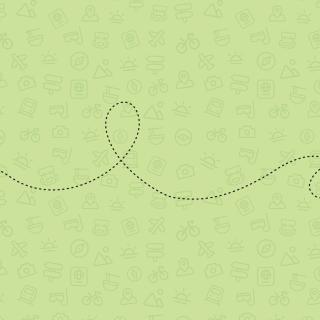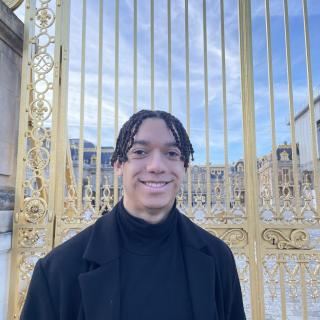Meet Jalaa’ Abdelwahab (Adelaide, Fall 1996), who has spent the past 15 years dedicated to eradicating polio—including significant time in the field in Egypt, Somalia, South Sudan, Afghanistan, and Pakistan—with organizations including the Centers for Disease Control and Prevention, World Health Organization, and UNICEF. Today, Jalaa’ serves as Senior Health Advisor and Deputy to the Global Polio Team Leader at UNICEF Headquarters, working towards the global goal of a polio-free world by 2018.
Read on to learn what motivates Jalaa’ to see polio defeated, the challenges that still remain, and how the lessons he learned studying abroad continue to influence him today.
IES Abroad: You grew up in Palestine and first studied abroad by attending Hope College for your undergraduate studies. What led you to the United States?
Jalaa' Abdelwahab: I grew up under Israeli military occupation, and I finished high school during the Palestinian first intifada or uprising. At that time, universities and even schools, including mine, were facing closure by the occupation forces, and Palestinians were denied the right to education. I was one of the few fortunate kids to go to the private Friends Quaker School in Ramallah and was able to attend classes in secret. After I finished high school, I secured a scholarship to Hope College in Holland, Michigan. I never really thought of leaving Palestine or my family. But I had little choice if I was going to complete my education and later realized, I never “really” left Palestine. It’s always been with me.
IES Abroad: Why did you choose to study abroad in Adelaide?
JA: The experience influenced me tremendously on many fronts. Even though I felt a bit lonely early on, I also felt liberated and free to be myself. I created lasting bonds with people I met. More importantly, I learned so much about Aboriginal culture and the history of the indigenous people of Australia. As a Palestinian growing up under Israeli occupation, I easily related to their struggles. I also took a course on Aboriginal Anthropology that expanded my horizons and enriched my spirit and imagination by allowing me to learn about their mythology and culture.
IES Abroad: What is the most valuable lesson you learned from study abroad?
JA: When I was considering applying to medical school, I realized that I really wanted to do something that impacts communities rather than an individual. I went on to complete a Masters in Epidemiology with a focus on International Health at the University Of Michigan School Of Public Health. Afterwards, I was selected for a three-year fellowship with the Centers for Disease Control and Prevention where I worked on projects in environmental health, infectious disease, and did my first short assignment with the polio eradication program in 2000.
But it was on a field assignment with the polio eradication program in South Sudan during the civil war that I realized this is what I wanted to do. That experience was beyond anything I could describe. I realized how noble and simple the goal for polio eradication is: once eradication is achieved, every single person will live without the threat of death or disability from polio. It is the definition of equity—something I have always dreamed of seeing and experiencing growing up in Palestine. I felt committed and inspired, and I embarked on a journey to fight this disease in all corners of our planet.
IES Abroad: Describe your current role at UNICEF.
JA: I am a Senior Health Advisor and the Deputy to the Global Polio Team Leader at UNICEF, HQ. I also chair the Eradication and Outbreak Management Group for the Global Polio Eradication Initiatives, which is comprised of senior management from WHO, UNICEF, CDC, Rotary International, and the Bill and Melinda Gates Foundation. Additionally, I manage the Health and Immunization (polio) Workstream. We work closely with our country offices, regional offices, partners, and government counterparts to develop and implement key strategies to stop poliovirus transmission in some of the most difficult and complex settings around the world where polio continues to circulate or areas that are at very high risk for outbreaks. We conduct mass vaccination campaigns during short periods of time (2-5 days) to vaccinate every single child with two drops of polio vaccine in an effort to wipe out the virus once and for all.
IES Abroad: The Global Polio Eradication Initiative (GPEI) has a goal of polio eradication by 2018. What is UNICEF’s role?
JA: UNICEF is one of the spearheading agencies in GPEI. The two main areas where UNICEF leads is the vaccine procurement and social mobilization and communication. For some people vaccine procurement might sound very simple, but it is far from it. In 2014, UNICEF procured more than 1.7 billion doses of oral polio vaccine and delivered them to more than 60 countries. This means working with manufactures to ensure availability, the right quality and price, and making all of the necessary arrangements to get the vaccine on time to countries to implement their vaccination activities that take place around the clock every year. The other part is social mobilization and communication that has become central to our success in the last mile towards eradication. Communities are at the forefront. Without them we can’t progress.
IES Abroad: What countries are you focusing on?
JA: In 1988, when GPEI started, polio cases were being reported from 125 countries with an estimated 350,000 cases. Today, polio remains endemic in only three countries: Pakistan, Afghanistan, and Nigeria. Even in these countries, poliovirus transmission is restricted to very few areas and the most vulnerable communities. Many of the areas affected by and at risk for polio suffer from insecurity and active conflict. This requires more intensified efforts to reach out to communities, maintain neutrality, and secure access and safety for frontline workers. We live in a global community: poliovirus anywhere in the world poses a threat to any unvaccinated child wherever they might be. That’s why as we focus on the remaining endemic countries, we also must remain vigilant on vaccinating children in all countries where immunization coverage is low.
IES Abroad: You have been involved in many vaccination campaigns. Is there a particularly meaningful experience that stands out?
JA: When I was working in Somalia during their outbreak in 2005-2007, we were monitoring a campaign in a camp for internally displaced populations just outside of the city of Merka. As we were leaving, a mother followed us to make sure we vaccinated her younger child, Ismael. He was missed by the vaccination team as he was playing outside. He was such a friendly, beautiful child. It was one of those moments when you realize the implications missing a child might have. If it wasn’t for his mother’s awareness and vigilance, we might have missed that child and he might have been later disabled by the disease, preventing him from living a full, healthy life. That’s why demand generation and community mobilization hold the key to our success.
IES Abroad: Where are you headed next?
JA: To a world free of polio. I struggle with turning my back on polio before it is eradicated. My journey with polio started in 2000 and today so much progress has been achieved. In 2015, only Pakistan and Afghanistan have reported cases. This is tremendous progress in the face of all the barriers, the conflicts, and struggles that plague our global community today. I would like to see this dream come true and to see all those hardworking front line workers, mothers, vaccinators, and social mobilizers reap the benefit once and for all. After that, I am sure there will be other menaces to conquer and the rest of life to explore.
To learn more about polio eradication and how to join these efforts go to:
http://www.unicef.org/about/employ/index_69764.htm
Middle Photo: Jalaa’ inspecting vaccine cold chain status with national staff in Jalalabad, Afghanistan.
Bottom photo: Jalaa’ (second left) with friends in front of the Twelve Apostles in Australia.




